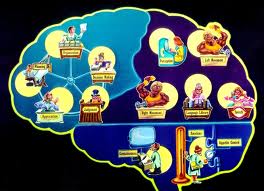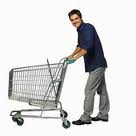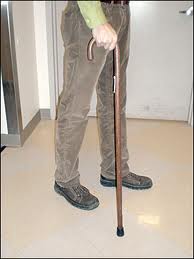 How can you manage mental and physical fatigue in your daily life? The normal fatigue you feel from brain injury is not like simple feelings of tiredness. It’s far from this. It exhausts all your physical and mental energy and leaves one in a brain fog where you can not think at all or physically accomplish anything. Your limbs feel so weak you just cannot be involved in doing anything until you get rest. Sleep is the only thing that helps you feel better. Sleep is also the only way your brain can repair itself. Sleep and rest helps you cope with the physical, mental and emotional stress of daily life. I am not saying to sleep all the time, but don’t fight it either. Most people try to fight it, as they feel if they push themselves hard enough everything will be better. This can actually make your symptoms worse and harder to deal with the stress of everyday living. Hence, those around you will find it hard to live with you. Contrary to what others say, you don’t get anything more accomplished by fighting off your bodies urge to rest.
How can you manage mental and physical fatigue in your daily life? The normal fatigue you feel from brain injury is not like simple feelings of tiredness. It’s far from this. It exhausts all your physical and mental energy and leaves one in a brain fog where you can not think at all or physically accomplish anything. Your limbs feel so weak you just cannot be involved in doing anything until you get rest. Sleep is the only thing that helps you feel better. Sleep is also the only way your brain can repair itself. Sleep and rest helps you cope with the physical, mental and emotional stress of daily life. I am not saying to sleep all the time, but don’t fight it either. Most people try to fight it, as they feel if they push themselves hard enough everything will be better. This can actually make your symptoms worse and harder to deal with the stress of everyday living. Hence, those around you will find it hard to live with you. Contrary to what others say, you don’t get anything more accomplished by fighting off your bodies urge to rest.
Frequently it can take several days to recover after expending energy. The earlier coping mechanisms are not successful like they were, such as: cups of caffeine, sugar or carbohydrates, or power naps does not work with brain injury, even if these things worked prior to injury. Unfortunately, you keep trying to find something that works. You need to find what new things work for you, and this is difficult…sometimes taking years to find the right balance. It can take this long simply because it is a complex injury because it involves every aspect of your life. What works for one, does not necessarily work for others. I’m giving you tips that worked for me, and hoping you can pick out several that will work for you. If you feel your symptoms are EXCESSIVE, don’t wait any longer. It may be a significant hormone imbalance. Read the previous tips on Hormone Imbalance and Fatigue and seek professional health as soon as possible.
A baby sleeps so much during the first year of life…and they grow more during this first year than any other year. Imagine how your brain can help repair with sleep! Sleep is the time that your brain repairs the damage. So your fatigue is one way of your body requiring rest to repair the damaged brain from injury or chronic illness.
Ways to Help You With Mental Fatigue
 Limit Distractions
Limit Distractions- Dim Lighting
- Keep External Noise to a Minimum
- Turn OFF or lower volume of stereos, radios, televisions

- Stay FOCUSED!
- Read journals or magazine. Read one article at a time then put aside. It’s cheap entertainment, and if you are like me…rarely recall that you read it anyway, so you can read again!
- Read a chapter in a book at a time then put aside.
- Caution: I stick with nonfiction reading. Only since injury I do not remember if it were fiction or nonfiction, so I just stick with nonfiction. It’s the safest way to keep the facts straight. Besides it is educational and challenges your brain and thinking!
- Time your telephone conversations when possible. Start with increments of 5-10 minutes and increase as tolerated.
- Limit all conversations.
- Watch television for brief periods, less than an hour at a time.
- Watch the local and world news daily. Keep yourself up-to-date, helps with orientation. Make it a time to relax or exercise while you watch television. Think about what is on the news and use it as a topic of family and friends conversations.
- Don’t worry if you can’t watch movies or follow plots. Stick to something that doesn’t take much concentration. [I’m 2 decades later, and still cannot follow plots or watch movies…but how important is that in the big picture?] Some people think it’s a joke…but don’t worry about what the simple-minded people think!
- Do a physical activity between mental activities. For example sort mail, then put away dishes from dishwasher. You may not be able to do this early after injury, but in time you will! I understand the distraction factor … and it just gets easier to handle, not necessarily resolved!
- Make a short list for a day or a week of what you want to do and mark off the list as you accomplish it. The list may be only one or two things, and that is okay. Don’t expect a lot … but if you do more than expected treat yourself at the end of the week to something special…manicure, pedicure, new bottle of lotion, a couple of hours with a friend, a walk in the park, etc.
- Alternating between Mental and Physical Activities helps with a better BALANCE between physical and mental fatigue and equally accomplishes tasks.
- Ride in the back seat if you are dealing with overload issues and mental processing. You will be more relaxed and not so jumpy! The driver will appreciate this as well. Speed can also cause dizziness. Avoid whatever you can to decrease your symptoms. Find out what works best for you. Always wear your seat belt!
- Don’t ever fight battles of small-minded people.
- Don’t let people squeeze you into their molds.
- Ignore jealous, critical and cynical small-minded people.
- Do NOT let small-minded people steal your joy.
- Do NOT be a people pleaser.
- Not everyone will like you.
- Not everyone will understand you.
- Just be kind and considerate but move on.
- Time is too valuable to be distracted.
- Pursue your own goals and dreams!
- Don’t respond to your critics. (Many people with brain injury can’t filter out external stimuli causing them to become increasingly vulnerable). WATCH THE VULNERABILITY!… If you for whatever reason did not get along with someone or a situation prior to injury, stay away after injury! They most likely will take advantage of your situation. Protect yourself from this.
I am still there 2 decades later. I’m trying to assimilate my life with turning on the television. I never drive with a radio on, and rarely a CD playing. It’s just another distraction, and driving needs all my thought processes.
Ways to Manage Physical Fatigue and Conserving Energy
- Organize your day and plan ahead
- Complete all your activities of daily living as soon as you get up in the morning (or routine that works for you). Getting these routine tasks completed is not as easy as it use to be. Do the best you can. By getting up and preparing for the day as though you were going to work or school is always important for your self-confidence.
- Shower, Bathing, Dressing, Shaving, Make-Up, etc.
- Rest after early morning ADL (activities of daily living). Do as much as possible without help. It takes a lot to do these tasks. Do these personal tasks everyday, and you will feel better about yourself and approach the day in a positive light. It’s hard to move on, and you can…but it will be gradual! Be kind to yourself.
- Work out a routine that minimizes the steps you take in the home
- Complete each task needed in a particular room before moving to another room. It’s likely one or two small tasks is all you can accomplish, but that is okay. Do not be hard on yourself.
 Prepare healthy snacks and meals for the day early in the morning when you most likely have the most energy. As you become exhausted a healthy snack or meal will already be ready and you’ll need the nutrition.
Prepare healthy snacks and meals for the day early in the morning when you most likely have the most energy. As you become exhausted a healthy snack or meal will already be ready and you’ll need the nutrition.- Find an Exercise you Enjoy & Do It Every Day!

- IF you are attending a Graduation, Birthday Party, Wedding, or gathering of any type … rest until time to attend function. Do NOT do anything else that will zap all your energy that day. Attending functions takes an excessive amount of physical and mental energy . It will also take a lot of energy to do your activities of daily living before attending (shower, bathing, dressing, shaving, make-up, etc.).
- Drive or ride the back roads with less traffic. The highways require quicker responses, and faster processing in the brain. Enjoy the slow ride, and scenery! You’ll get there in nearly the same amount of time, with less stress and not feel exhausted!
- Shop early in the morning when fewer people are around.
- Shop on Tuesday or Wednesday when fewer people go shopping and less in the environment for the brain to process.
- Card isles are especially difficult. Stay away if possible. Have someone else pick up cards or just buy a mixed variety box of cards. Costco, Sams, BJs and other Warehouse Clubs carry an excellent assortment of cards. If you know of someone with a membership have them pick you up a box of card.
- The Warehouse Clubs are an excellent place to practice walking. Push a grocery cart to balance yourself. The isles are wide so it’s less of a challenge manipulating the cart around. Never go on weekends and go early in the morning when they open. This is a good and inexpensive way to get exercise and challenge your mental processing at the same time. You could shop as well. Do not become distracted … focus on your balance and walking.
You need to avoid crowds when possible. This makes it even more difficult for balance or brain processing. Always use assistive devices prescribed by your physical therapist in crowds! Prevent potential injuries. Without assistive devices you may be at risk for injury. It’s okay NOT TO BE COOL, just be safe! Crowds can only see the cane, walker, wheelchair, etc. and heed warning to move around you than push you. You may be pushed otherwise in crowds leading to injury because you can’t keep up with the pace of crowds.  For your safety you need to temporarily revert to using assistive devices…that you may need only for large groups or crowded events. I prefer not using anything daily, but after several serious injuries in crowds I have learned it’s more important to always be safe! Using assistive device in crowds and inclement weather is important!
For your safety you need to temporarily revert to using assistive devices…that you may need only for large groups or crowded events. I prefer not using anything daily, but after several serious injuries in crowds I have learned it’s more important to always be safe! Using assistive device in crowds and inclement weather is important!
Everyone has a different tolerance to pain, fatigue, stress and various things that occur in life. This level of tolerance comes from your life experiences, beginning as an infant, toddler, child, teen, young adult and throughout life. Our responses are all different. Remember you are UNIQUE … your responses to everything in life differ from one person to another.
It is especially difficult for those who minimize their own problems, than this is compounded by the fact that the healthcare professionals will also minimize your problems. Be Alert & Aware to this happening! Health care professionals often minimize your symptoms and blame them on depression, anxiety, female, male, child, occupation, and by doing this will miss the diagnosis completely resulting in permanent disability and even death. The majority of Americans will NOT go to a physician unless it is significant … we have better things to do with our time, energy and money!
Related articles
- Mild Brain Injury: Implications for Independence (llanojake.wordpress.com)
- Fighting Chronic Fatigue Syndrome With a Natural Energy Diet (everydayhealth.com)
- Brain injury rehabilitation, aphasia. brain injury, Brain injury awareness, Marcus Rosenberger. 2/5/12, brain injury is not partial to who it may affect. It can happen to everyone, anytime, anywhere… (realestatesavant.wordpress.com)
- Lost & Found: What Brain Injury Survivors Want You to Know (katharinetrauger.wordpress.com)
- What do I need? Or where do I go? To relearn my computer or purchase a new computer after brain injury? (braininjuryselfrehabilitation.com)
- Could this Nightmare with Traumatic Brain Injury be Ending? (braininjuryselfrehabilitation.com)

Vickie
February 27, 2012 at 6:43 pm
Great article! I will put a link on my site!
Hope, Health, and Happiness,
Vickie
brain injury self rehabilitation (BISR)
February 28, 2012 at 11:27 am
Thank you. Feel free to add comments for any suggestions that you believe would be helpful to work through brain injury.
Coraene Brown
March 3, 2012 at 7:27 pm
Thank you Anita & Vicki.
Coraene Brown
craiglock
November 5, 2013 at 5:39 pm
Thanks for sharing great tips and can closely relate to your article. Have reblogged
All the best
craig